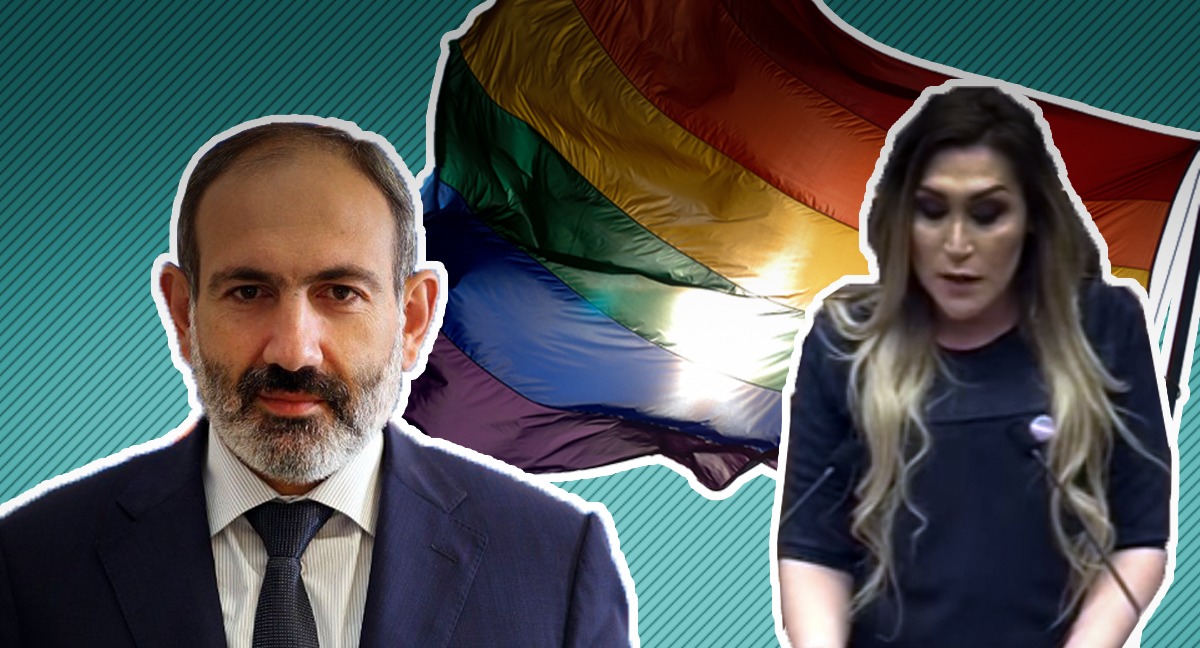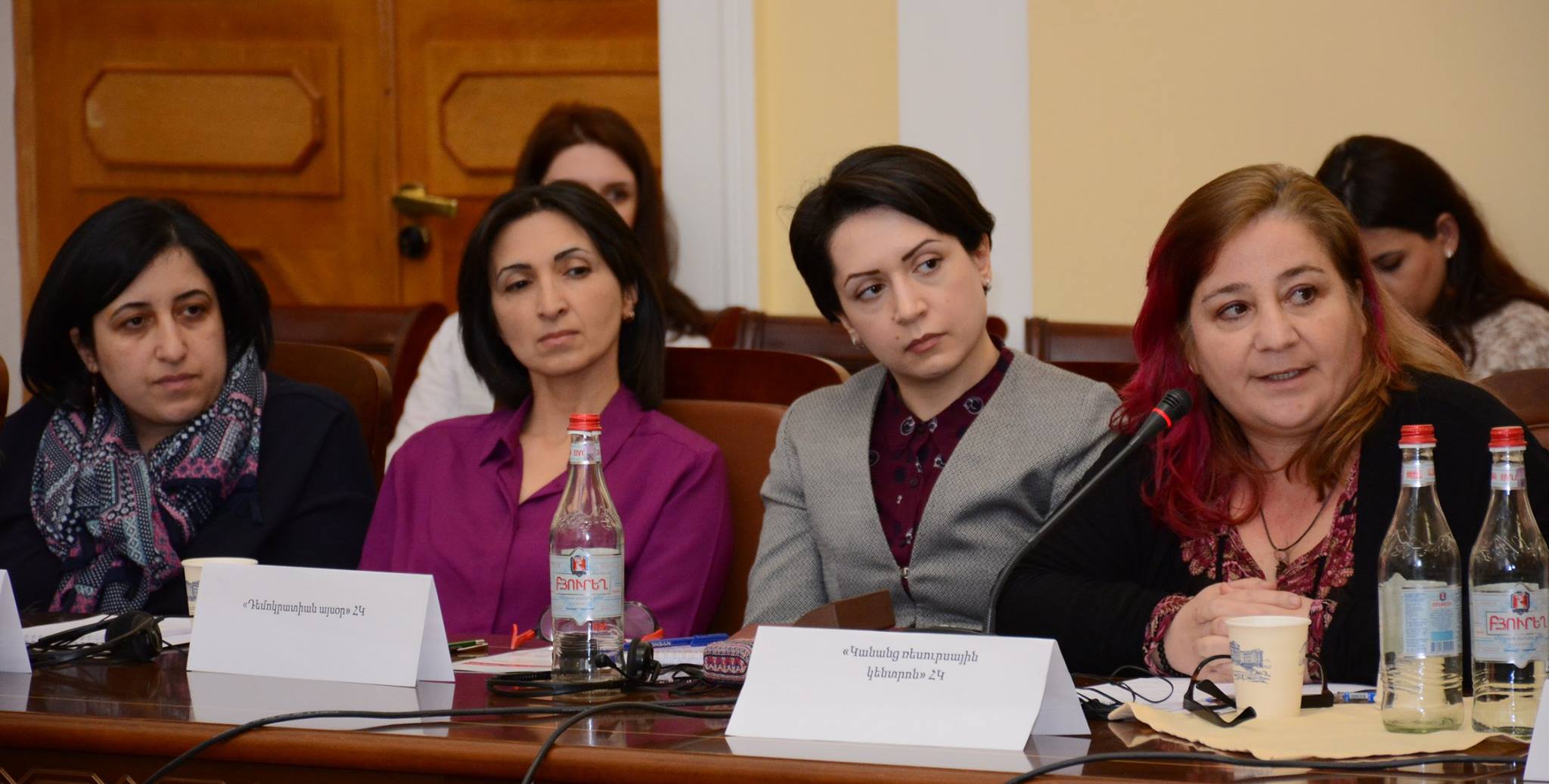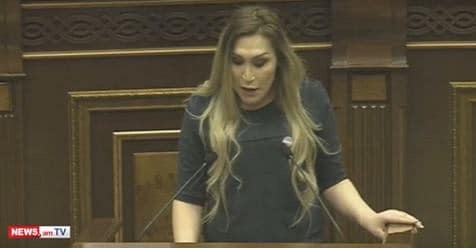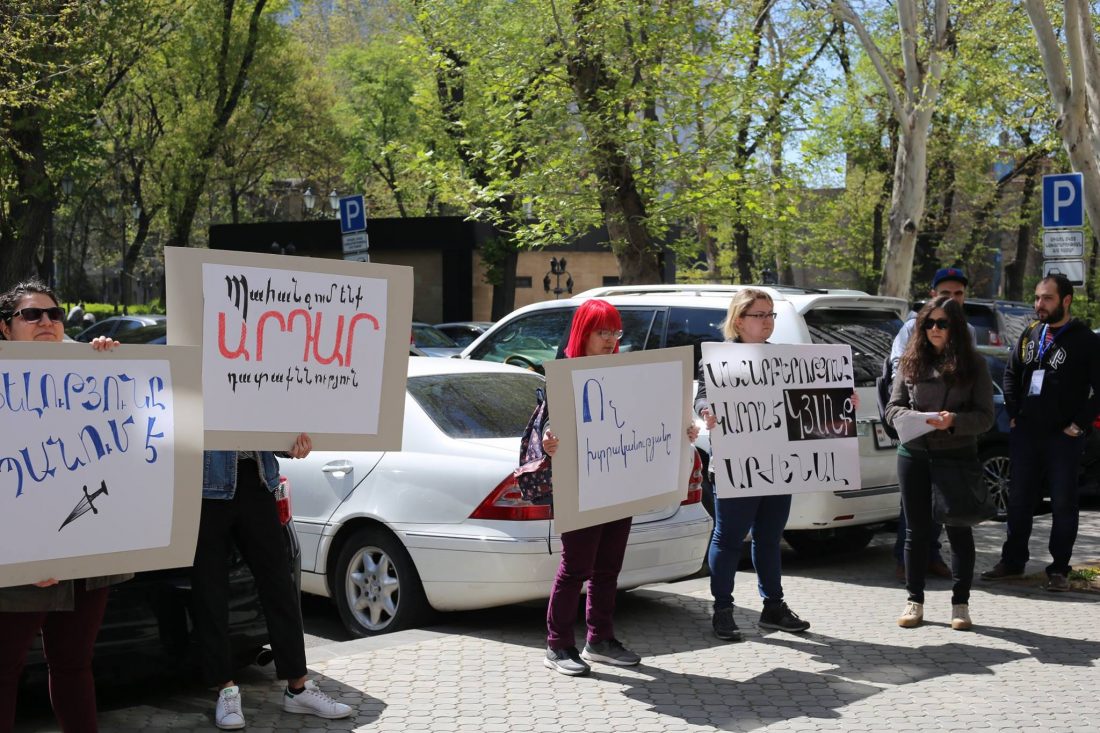

In a last-ditch attempt to regain support, Armenia’s corrupt former ruling class have joined with an odious crew of far-right and homophobic forces, attempting to turn society against the revolution. Despite the threat, Pashinyan still has a unique opportunity to build a new Armenia based on solidarity and equality.
Speaking at a forum on women’s issues for MPs and activists in Armenia on 8 March, activist Lara Aharonian gave a speech about the rights of poor women, women with disabilities, single mothers, and lesbian, trans, and bisexual women, among others. The backlash was immediate, with Aharonian facing a barrage of online abuse and death threats.
The hostility was backed by discriminatory narratives and hate speech, including threats to kill and rape her as well as to harm her family, all because she mentioned the mere existence of Armenian lesbian, bisexual, and trans women.

Less than a month later, transgender woman Lilit Martirosyan addressed the National Assembly during a public hearing on Human Rights, which was also followed by hatred and death threats.
She spoke about the problems queer people faced including hundreds of attacks against them. This did not bother the anti-human rights activists, rather it brought new calls for crimes. An MP from the opposition Prosperous Armenia party even called burning Lilit and other LGBT people in the square.

During the hate assembly, a priest from Armenian Apostolic church made a speech demanding the criminalisation of ‘sodomy’ in the style of the European medieval church, something that was not in the agenda of the Armenian Apostolic Church even in the Middle Ages.
It has been almost a year since Armenia’s Velvet Revolution against the country’s corrupt leadership, yet as Aharonian’s case showed, pro-democracy and pro-human rights activism is still vulnerable.
Since the revolution, Armenia has walked a tightrope of transition as revolutionary fervour has given way to the slow process of reform.
Parliamentary snap elections last December were the final step in consolidating the new Armenia, a country committed to a future of democracy, rule of law, and transparency.
During this process, the forces of the former ruling elites have attempted to stoke controversy between the post-revolutionary government and society, as well as find ways to attract civic groups towards themselves.
After losing the elections and their representation in parliament, they have continued to unite around a regressive and manipulative agenda to discredit the revolution and Prime Minister Nikol Pashinyan’s government.
One of the main topics they feel can be used to polarise people, is the topic of LGBT+ people.
[Read stories about queer people from around the Caucasus: ‘Our families are as holy as yours’ — stories of acceptance]
Attacks on queer people since the revolution
On 3 August 2018, nine people were attacked in the village of Shurnukh, in south Armenia. They had travelled there for a queer gathering and were hosted by a family known for its opposition to the former authorities and for having a son who was an LGBT+ rights activist.
During the attack, a mob surrounded the house, shouted threats referring to the inhabitants’ sexual orientation, and eventually chased the group out of the village, throwing stones and causing serious injuries to some of them.
[Read more: Nine queer rights activists attacked by mob in Armenia]
The incident demonstrates how members of the former regime are generating homophobia to promote their political agenda. The targeted family’s oppositional views and stance were known in the village, as was their son’s sexual orientation.
So, what caused this sudden change within the residents of the village? As it turned out, the father of the family had organised a petition soon after the revolution to lodge a collective complaint with Pashinyan against community leader Hakob Arshakyan for corruption. To send this petition, he used his son’s email account, thus unconsciously making him a target. The fact that the young man was gay became a useful tool to motivate the attackers.

Several days after the attack, a group of conservative anti-rights activists and supporters of the former government, who earlier justified the attacks in Shurnukh online, came to the village to organise a national celebration within the community.
Another incident, a skirmish between transgender people and police officers, took place in one of the capital’s police stations on 14 August 2018. Footage of the incident, which was circulated online, raised more questions than answers.
The homophobically titled and worded clip raised suspicion among some human rights activists that the incident might have been staged. According to them, this was an example of manipulating the vulnerability of transgender people to channel public discourse in a specific direction and to instigate hatred.
Another video that appeared in August featuring children in carnival-style costumes at a youth camp was spun as ‘gay propaganda’. The children’s images were disseminated across the web, violating their right to privacy and making them and their parents targets.
The incident also generated homophobic articulations and attitudes. A number of individuals made it their duty to publicly expresզs their homophobic stance. One example was a local band, the Hot’n Roll Band, who made a thinly veiled call to ban gay people from attending their gig in August.
The old political order clinging on
These incidents where homophobia was promoted unfolded in a heated political context. Concerns over tensions in Armenian-Russian relations were in the air. A criminal case was filed against Armenia’s second president, Robert Kocharyan, for ‘overthrowing the constitutional order’.
The rise of anti-rights activism in Armenia has become especially apparent in recent years. Human rights defenders link this to the emergence of NGOs in Armenian civil society that are tacitly supported by the Russian government. These organisations regularly target defenders of women and LGBT+ people, presenting democratisation and human rights movements as a Western policy, and aiming to impede the implementation of legislative reforms.
It is not surprising that these groups are now collaborating, in a mobilised way, with the defenders of the pre-revolutionary political regime by combining their information campaigns.
For example, former MP Aragats Akhoyan, having not made any public statement for quite some time, joined a press conference against LGBT+ people after his brother Stepan, the owner of construction firm Spitak Tnak, was arrested as part of the new government’s corruption crackdown. Stepan Akhoyan had received a state award from former President Serzh Sargsyan as well as numerous government construction contracts.
During major political changes in the country, the demonisation of LGBT+ people’s rights became one of the main narratives of the parliamentary election campaign for the former ruling elite in order to take away votes from the revolutionary forces, and especially from Pashinyan’s team. This technique is being used to create new dividing lines within society by using the time-honoured tradition of creating mythical foes.
The issue provides members of the old political order (including supporters of Kocharyan, the former ruling Republican Party, and their former partners, the Armenian Revolutionary Federation (ARF) and the Prosperous Armenia Party) with an opportunity to polarise public opinion around the rejection of LGBT+ people. They make use of attitudes of either active or passive homophobia and a prevailing lack of awareness on LGBT+ issues.
Ultra-right populism in a pre-electoral context
These political parties started manipulating LGBT+ topics before the elections by proposing several homophobic legal amendments.
In October, MP Tigran Urikhanyan of the Prosperous Armenia Party introduced an amendment to the Family Code that would explicitly outlaw same-sex marriage in Armenia, even though the 2015 constitutional referendum had already effectively done so by defining marriage as being between a man and a woman. The bill was later rejected by the government.
Former Vice-Speaker of the National Assembly Eduard Sharmazanov, together with several Republican Party MPs, initiated an amendment to the Law on the Protection of the Rights of the Children according to which ‘homosexual propaganda’ would be banned. The government did not approve the project.
Moreover, the ‘fight against immorality’ and the preservation of ‘national values’ were slogans of the Republican Party’s electoral campaign.
Consequently, the new government, which views public support as its main resource, faces a difficult challenge in how to deal with compensating for damages done and restoring the rights of LGBT+ victims. Openly protecting LGBT+ people’s rights could jeopardise the trust of people who have been manipulated and misinformed towards the new government.
In late October, the questions of hosting the 11th LGBT Christian Forum of Eastern Europe and Central Asia in Yerevan became a hot topic for political debate. The anti-rights activists organised virtual and street campaigns against the organisation of the forum. A debate over the issue was even held in parliament.
Gevorg Petrosyan, an MP from the Tsarukyan faction, asked Pashinyan to ban the LGBT+ forum in Yerevan. He said that jeopardising the existence of the traditional Armenian family was a bigger threat than economic monopolies or unsecured borders. Petrosyan’s remarks should be viewed within the logic of electoral processes since the issue was raised at a session convened to dissolve the National Assembly.
While Pashinyan had managed to avoid speaking about LGBT+ issues for some time, it became impossible to evade the question in parliament. Pashinyan’s answer could be interpreted in multiple ways: twice in his answer, he stressed that the ‘traditional Armenian family’ is the highest value for him. He did not mention human rights, instead, presenting a story about meeting a young man in Paris who had barely escaped Armenia after facing persecution because of his sexual orientation.
Pashinyan noted honestly that the LGBT+ issue was a real ‘headache’ for his government, which they might possibly bypass. He said, however, that one day, Armenia must eventually face this issue.
Pashinyan’s answer faced a mixed reaction from LGBT+ rights defenders. Some refused to accept the new government’s approach. Perhaps the most important consequence of Pashinyan’s comment was that his apparent neutrality further radicalised the wave of homophobic propaganda.
A few days later, on 1 November, Catholicos Karekin II the head of the Armenian Apostolic Church, appeared in the wave of homophobic discourse. In a statement, he condemned ‘steps by the LGBT representatives aimed to incite people’ and qualified these actions as a ‘temptation for our growing generation’ and ‘a threat to our nation’s survival’.
The next day, several anti-rights activists said on Facebook that they had chased members of ‘New Generation’, the host of the LGBT forum, while in a car. The organisation was forced to suspend its activity for several days.
The challenge ahead
After failing to bypass the ‘headache’: the post-revolutionary government faces a challenge.
On 6 November, the Chief of Police, Valery Osipyan, said that the LGBT forum would not take place as he personally considered it ‘inappropriate’ to hold the event for security reasons. Osipyan stressed that the police would have managed to ensure the security of the participants, but that the organisers agreed to cancel the event after a preliminary assessment carried out by the police.
The statement was slammed by human rights defenders who denounced it as a restriction of the freedom of assembly and a failure of the state to comply with their obligations. Meanwhile, anti-rights activists continued their rallies and marches in the capital despite the cancellation.
New right-wing extremist formations have emerged which include the entire package of European and Russian pro-fascist right-wing concepts, including extreme essential nationalism, the worship of the Orthodox Church, and intolerance towards all subcultures.
The former political elites have expanded their activities in this direction even after losing parliamentary elections. They have continued their strategy of obstructing pro-democratic and anti-corruption policies by continuously undermining public trust towards the new government and splitting public solidarity.
While it is true that the government’s stance over LGBT+ rights protection still runs the risk of becoming a source of manipulation of public opinion, the wide support and trust enjoyed by Pashinyan could be seen as an opportunity.
Pashinyan could and should use his voice to break the logic of persecution and discrimination on the grounds of sexual orientation or subculture affiliation.
In addition, the police should ensure the effective and proper investigation of all cases of hate speech, assaults, and attacks on human rights defenders.
The revolution has provided solid ground for developing an institutional and legislative base for equality and social justice in Armenia. But now it is time for real actions and reforms, not for mere speeches.
As Lara Aharonian underlined in her speech: ‘The decade of making declarative decisions and speaking beautifully is over and it is time to act’. The Civil Society-Parliament cooperation platform, where she delivered her speech, should make its first vocal step and publicly reject any kind of stigmatisation and targeting of this woman’s rights defender.
It is up to the new authorities, who control both the executive and legislative branches of power, to decide where the revolution is going and whether the reforms will truly be profound.
The opinions expressed in this article are author’s alone, and do not necessarily reflect the views of OC Media’s editorial board. The author’s photo by Nazik Armenakyan.








